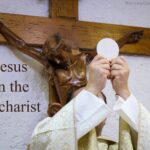
The Mass is a distinctive form of worship practiced by Catholics. It is the most important and sacred liturgical act of the Church.
Jesus instituted the Eucharist at the Last Supper, a Passover meal, on the night before He was Crucified. From the earliest days of the Church, Catholics have followed Jesus command to “Do this in memory of Me” by celebrating Mass.
The Mass is a way of praying that is made up of other prayers, readings from the Bible, hymns, lessons, signs, symbols, gestures, rituals, and sacrifice.
The Mass mysteriously makes us present at the Last Supper, Jesus’ sacrifice on the Cross, and the Supper of the Lamb in Heaven. It is there that we are united with the angels, the saints, and Catholics all over the world.
The Mass has developed over the centuries but the essential elements and fundamental structure have stayed the same.
Although Catholics are only obligated to participate at Mass every Sunday and certain holy days, Mass is celebrated every day.
We come together to worship God and pray for the world:
We worship God the way He wants us to worship Him:
There is a lot that happens at a Catholic Mass:
A lot of people have questions about Mass:
For I received from the Lord what I also delivered to you, that the Lord Jesus on the night when He was betrayed took bread, and when He had given thanks, He broke it, and said, “This is my Body which is for you. Do this in remembrance of Me.” In the same way also the cup, after supper, saying, “This cup is the new covenant in my Blood. Do this, as often as you drink it, in remembrance of Me.” For as often as you eat this Bread and drink the Cup, you proclaim the Lord’s death until He comes.
1 Corinthians 11: 23-26
The Mass fulfills Jesus’ command to “Do this in memory of Me.”:
Much of what Catholics do at Mass originated in the early Church:
The command of Jesus to repeat his actions and words “until He comes” does not only ask us to remember Jesus and what He did. It is directed at the liturgical celebration, by the apostles and their successors, of the memorial of Christ, of his life, of his death, of his Resurrection, and of his intercession in the presence of the Father.
Catechism of the Catholic Church 1341
The Mass is divided into different parts:
The history and meaning behind the rituals of Mass:
For this reason, to understand the value of the Mass, we must first understand the biblical significance of “memorial”. It is “not merely the recollection of past events but makes them in a certain way present and real. This is how Israel understands its liberation from Egypt: every time Passover is celebrated, the Exodus events are made present to the memory of believers so that they may conform their lives to them”. Jesus Christ, with his Passion, Death, Resurrection and Ascension into heaven brought the Passover to fulfillment. And the Mass is the memorial of his Passover, of his “exodus”, which He carried out for us, so as to lead us out of slavery and introduce us to the promised land of eternal life. It is not merely a remembrance, no. It is more: it is making present what happened 20 centuries ago.
Pope Francis, General Audience, November 22, 2017
We are called to full participation at Mass:
Mass teaches us how to respond to God, and then the world around us:
After working on us during Mass, God sends us out:
The Truth, Goodness, and Beauty of the Catholic Church
Where Heaven and earth come together:
Share this page with friends and family to start a conversation about your faith.
Don’t miss a post. Learn more about the Catholic Church and strengthen your Catholic faith.
Find more Fiercely Catholic video issues here.
Subscribe here.


